Eyes to the skies for swifts
a4fd2a49-4ab9-4fe4-a1fe-238642c4b010

The RSPB is asking the public to record any Common Swifts they see swooping across Britain this spring and summer.
With their long scythe-like wings and their high-pitched screeching sound, swifts are one of the most visible and audible birds in our skies at this time of year. They are superb fliers and travel up to 6,000 miles from Africa to Britain and Ireland every summer to raise their chicks. Over the course of their journey from Africa they never touch the ground, which explains their generic name Apus, which translates as ‘without feet’.
Sadly, swifts are now on the Amber list of Birds of Conservation Concern, as their breeding population has fallen by more than a quarter over the past 25 years. The reasons for this decline remain unclear, but loss of nesting sites is a possibility. Swifts often nest in holes old buildings, but as a result of renovations these can be blocked up or even destroyed.
Claire Barnett of the RSPB said: “It is known that swifts nest throughout Britain in our villages, towns and cities, but we need the public’s help to identify exactly where. The scream of the swift marks the start of summer for many. Swifts will return to the same nesting site every year to raise their chicks, but once it fledges it may not land for another four years, eating, drinking and sleeping on the wing.
“It is devastating that swifts are declining at such a rapid rate, and it's important that we know where they are nesting so we can work with home and business owners, and builders and developers to help protect them.”
If you see swifts this year anywhere in Britain, then the charity wants to hear from you. The RSPB is particularly asking for records of low-flying screaming parties of swifts, which indicates they are breeding in the area. You can add your records to the online RSPB Swift Inventory at www.rspb.org.uk/applications/swiftsurvey.
With their long scythe-like wings and their high-pitched screeching sound, swifts are one of the most visible and audible birds in our skies at this time of year. They are superb fliers and travel up to 6,000 miles from Africa to Britain and Ireland every summer to raise their chicks. Over the course of their journey from Africa they never touch the ground, which explains their generic name Apus, which translates as ‘without feet’.
Sadly, swifts are now on the Amber list of Birds of Conservation Concern, as their breeding population has fallen by more than a quarter over the past 25 years. The reasons for this decline remain unclear, but loss of nesting sites is a possibility. Swifts often nest in holes old buildings, but as a result of renovations these can be blocked up or even destroyed.
Claire Barnett of the RSPB said: “It is known that swifts nest throughout Britain in our villages, towns and cities, but we need the public’s help to identify exactly where. The scream of the swift marks the start of summer for many. Swifts will return to the same nesting site every year to raise their chicks, but once it fledges it may not land for another four years, eating, drinking and sleeping on the wing.
“It is devastating that swifts are declining at such a rapid rate, and it's important that we know where they are nesting so we can work with home and business owners, and builders and developers to help protect them.”
If you see swifts this year anywhere in Britain, then the charity wants to hear from you. The RSPB is particularly asking for records of low-flying screaming parties of swifts, which indicates they are breeding in the area. You can add your records to the online RSPB Swift Inventory at www.rspb.org.uk/applications/swiftsurvey.

